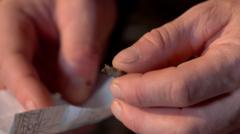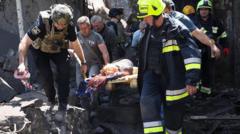As the nature of warfare evolves, Ukrainian medical professionals have embraced innovative magnetic technology to enhance surgical procedures for shrapnel victims. This minimally invasive tool is changing the landscape of battlefield medicine, with thousands of units deployed to assist frontline medics.
Magnetic Innovations: Life-Saving Technology Transforms Battlefield Medicine in Ukraine

Magnetic Innovations: Life-Saving Technology Transforms Battlefield Medicine in Ukraine
A groundbreaking magnetic extractor is revolutionizing medical treatment for shrapnel wounds in Ukraine, providing critical care to injured soldiers on the front lines.
Ukrainian serviceman Serhiy Melnyk holds a small piece of rusty shrapnel that was once lodged in his heart, a grim reminder of the brutal realities of modern warfare. “It grazed my kidney, pierced my lung, and lodged itself in my heart,” he recounts, the danger of his injury emphasizing the increasing prevalence of shrapnel wounds on the battlefield.
The rise of drone warfare has led to injuries like Serhiy's becoming alarmingly common, with reports indicating that shrapnel wounds now comprise up to 80% of battlefield trauma in Ukraine. A piece of shrapnel could have proven fatal; however, his survival was aided by a remarkable advancement in medical technology: a magnetic extractor.
Cardiovascular surgeon Serhiy Maksymenko shared his innovative procedure, highlighting how with a small incision, the magnetic device artfully extracts shrapnel from the heart. “I don’t have to make large cuts in the heart,” he explains. This technique has already led to over 70 successful operations in just a year, reshaping the narrative of frontline healthcare.
The story behind this tool involves volunteer Oleh Bykov, who transitioned from a legal career to supporting the military after 2014. Inspired by frontline medics’ urgent requests for an efficient solution, Oleh's team updated the magnetic extraction technique, originally utilized as far back as the 1850s, developing it for modern surgical applications.
Despite lacking official certification amid martial law, the magnetic extractor has been distributed broadly, with 3,000 units now in use across Ukraine. Medics like Andriy Alban, who operates often under fire, attest to its lifesaving capabilities, illustrating how it simplifies the search for shrapnel compared to traditional methods.
Prominent war medic David Nott echoes this sentiment, emphasizing the significance of developing tools that cater to high-stakes situations. In this context, conventional regulations give way to immediate needs, prompting innovations that could potentially benefit war zones globally, such as Gaza.
In Lviv, Serhiy's wife Yulia expresses profound gratitude for the new technology that saved her husband's life. “Thanks to them, my husband is alive,” she says tearfully, reflecting the collective appreciation for those working tirelessly to pioneer medical advancements amidst chaos.




















